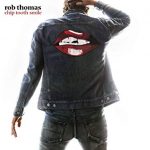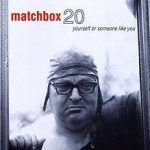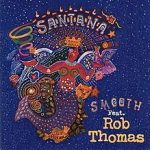Rob Thomas first had success as the frontman for Matchbox Twenty, whose 1996 album Yourself or Someone Like You has sold over 15 million copies thanks to songs like “3AM”, “Push”, and “Real World”. Next came a collaboration with Carlos Santana that yielded the smash hit “Smooth”, which won three Grammys and is ranked as the Number Two song on Billboard’s all-time list of Hot 100 songs. Matchbox Twenty followed up with hits like “Bent”, “If You’re Gone”, and “Unwell”, and Thomas launched a solo career in 2005 with the Number One album …Something to Be. Thomas’ new album Chip Tooth Smile will be released in April.
This interview was for a preview article for noozhawk.com for the 3/29/19 concert by Rob Thomas at the Chumash Casino – a benefit concert for Sidewalk Angels Foundation, which supports no-kill animal shelters and animal rescues and whose President is Rob’s wife Marisol. The interview was done by phone on 3/8/19.
Jeff Moehlis: What can people look forward to at your upcoming show?
Rob Thomas: I think it’s either our first or the second show – it literally kicks off everything as far as the full band goes. So that’s kind of exciting, because we could totally screw up and that’s always good. I mean, I’m lucky enough, just like with Matchbox, I’ve had the same solo band now since 2004, so it’s another family that I kind of step into. These guys are a little different, they’re kind of player’s players, and it’s just about pure joy and energy and fun, and getting everybody in that shared moment. So hopefully it’s just a chance for everybody to unplug and leave everything else behind, and just spend a couple of hours celebrating life with everyone around them.
JM: I understand that the show is a benefit for the Sidewalk Angels Foundation. Can you tell us a bit about that?
RT: My wife and I started it over 15 years ago. It started off so that we could get other shelters and no-kill shelters off the ground around the entire country. Then we moved into helping with animal rescues all over the world – Puerto Rico, Jamaica – and working with different advocate groups and also working with homeless shelters that take in people with their animals so that when they get displaced they can keep their animals with them. Some people, like me, if I lost everything and I had my boys with me I would probably live on the street and I would take them to a shelter with me. And there’s groups that we work with that help kids with autism, and animals are the only thing that can help them communicate.
So it’s branched out from just the 23 or 24 different shelters that we’ve actually helped build off the ground and get them medical centers and get kennels and run and all those things. It’s kind of branched out into everything that we can possibly do to help people to find ways that people can better understand the relationship between us and animals. It you go to sidewalkangels.org, you can actually find things in your local area, where we’re starting to help that you can find out about so that you can donate, because even if you’re not donating to Sidewalk Angels, maybe you’ll find something that we’re working with that appeals to you.

JM: I understand that you have a new album coming out, Chip Tooth Smile. What, to you, is special about the new album?
RT: I think every album should be pretty special. All the songs are pretty autobiographical. It’s a new record that I made with Butch Walker for the first time, as a producer. Butch is an amazing singer-songwriter in his own right, and so I think having that to push me… You need to find new ways to get excited about not just writing, but making records, and I think Butch helped me do that. But I think like anything, you want to look back and you want to say, “I think that this is a great representation of who I am now.” I like it more than I liked the last record, in the sense that I feel like I know what I’m doing better. That’s really the only thing you can do. You’re only competing against yourself at some point.
JM: I really like your new song, “One Less Day (Dying Young)”, which is from the new album. It has such an uplifting sound and message. What inspired you to write that particular song?
RT: A friend of mine and I were talking about how everything we hear about is about staying young forever, and people that never want to get old, and it struck us that the alternative to getting older is pretty bleak. We’ve lost some very, very close people to us in the last couple of years, so you realize that getting older is a privilege, and it’s not afforded to everyone. I’ve had friends that I lost just after high school, and they never got to get older. And I’ve had friends, like I say, who we’ve just lost last year. So instead of “you only live once”, it’s more like you die once, and that you live every day. So this song was just about appreciating that every day you get is a gift.
JM: I have a friend who is a huge fan, and that song came out on her birthday, and she thought that as such a beautiful present. So I wanted to thank you on her behalf.
RT: Right on – I’m glad she found it.
JM: You’ve been doing this for a while. How has your songwriting process changed over the years? Do you find it easier now, or harder now, or about the same?
RT: You know, in some ways I think it’s easier because when you first start out, you have a talent, and you hear songs and you’re just writing the songs that you hear. And then if you’ve being doing this a decade and you’re doing this at a good level, if you’re lucky, you start bringing craft in there. You start understanding how to take those songs that you’re hearing and try to hopefully craft them a little better, and make them a little more personal, make them a little more about you.
And then, twenty years in now, that part is easy – the hearing the music and wanting to craft it. The problem is I’ll go through now like four or five albums of songs before I make one album, because I also now have the ghost of everything that I’ve done before that I’m trying to compete against. You’re better at what you do, but at the same time you have more behind you, so you want to make sure that you’re not just ripping yourself off over and over and over whenever you’re making a new record, that you’re not just making the same record over and over and over again.

JM: If you don’t mind looking back, what are your reflections on the first Matchbox Twenty album?
RT: We look back on it and we hear the songs as being really good songs, and thinking that’s why we had a chance at making it. I think we can look back on it and we can hear our younger selves, not as good musicians. If you’d go back and see us live, when we were first starting out, we just weren’t a great band. I don’t know how we could be.
I remember when we got the record deal, one of our first big, big shows that we played, we opened for the Stones. It was us, Dave Matthews, Smashing Pumpkins, and the Rolling Stones. So when we got offstage, we’re standing there looking, thinking “Wow, these guys are fucking really good.” It just drove us to want to become a better band, and become that live band that we always wanted to go see. And I think we are now. I think by the second record, definitely by the third record, we became a great, great live band. But that was just because that was something we were really striving for.
JM: I have to ask – what’s the story behind the camel in the “Real World” video?
RT: [laughs] The “Real World” video was nothing, man. If you go through every scene in that video, it’s just about what is stupid and makes no sense that we can do. Like, Kyle [Cook] is in an ice cream van and he’s he’s giving out meat to the kids, and Paul [Yale]’s a waitress that just starts losing his mind and running around. Everything was just like us and the director creating vignettes, you know what I mean? So we were like, “Elevator – how about a zebra in the elevator?” “Bowling alley – how about a camel in the bowling alley?” They had no reference whatsoever, but if you look back at ’90’s videos, none of them did. ’90’s videos didn’t make any sense at all. We were all just walking down the street holding our arms like it hurt, and looking far in the distance like we’re seeing something, and then they put a cool filter on it. That’s was like every ’90’s video.

JM: I’m sure you’re well aware that the song “Smooth” is 20 years old now.
RT: Oh yeah.
JM: What was it like working with Santana on that?
RT: It was great! Me and Carlos have continued to work together, and have done different projects and played together, and stayed friends. We communicate a lot. We come out to each other’s shows, and we get up and play music together. The relationship that I got with him and with Clive Davis – I became very close to both of them – that’s the one thing that really is the most beautiful thing that came out of this.
I met Carlos right at the end of our first record, before we started the second record, and he was a really good mentor to have, because we’re coming off this success but we didn’t know what that meant. We didn’t know how to apply that to our lives. And Carlos understands the difference between being a celebrity and being a famous musician. Carlos has always been a famous musician. He’s never just been an empty celebrity that you care about his personal life as much as you care about the music that he’s making. I think he really helped me find a really good spot and a direction that I wanted to be in, and make me understand that the only things that I’m responsible for are my motives and my intentions and my purpose, those things. I can’t control the outcome of any of the things that happen to me. So the only thing that I can do is try to make the best music I think that I can each time I do it, and then just go play it and keep your head down and shut up.
JM: I think it’s cool that you wrote a couple of songs with Mick Jagger. What was that experience like?
RT: Working with Carlos, working with Mick Jagger, and working with Willie Nelson – you can’t explain the moments. Each one of them, you learn something different. Mick is just this total gentleman who once held a show for me that I was coming to see in Scotland, and he didn’t come onstage because I was running behind, and he wanted to wait until I got there. He’s that kind of gentleman.
I think there are certain things that you can learn from books, there are things you can learn from watching people. But when you’re in the room with some of the best writers – a guy like Mick – and you realize that he’s not just a performer, when you sit in a room with him you remember where all those great songs that he and Keith wrote came from, all those great melodies that he wrote, you realize that he’s a fucking great songwriter as well.
JM: What advice would you give to an aspiring musician, or an aspiring songwriter?
RT: It’s hard to say now. Above all, the three things that matter the most in the world are the song, the song, and the song. No matter what you do, no matter how cool you are, no matter how great you play, you’ve got to have a great song.
And everything else, I’m really not the one to ask. Right now, there’s an 18 year old songwriter out there that understands the new world, and the new markets, and the new technology, and understands the business of this probably way better than I do. And I’ve been doing it for over 20 years. I’m lucky enough to have a built-in fanbase, and I have a good label, but it’s just a different world out there today. I think that the only thing that stands the same is that you have to really, really believe in what you’re doing, and whatever you do you need to do it with a good song.
JM: Right now you have the solo album coming out, and you’ve got a tour coming up. Is there anything in the works with Matchbox Twenty?
RT: Yeah. We haven’t solidified anything yet. We talked about maybe doing something next year, even if it’s just a small thing, since it’s 2020. I just had dinner with Paul [Doucette] from Matchbox the other night, and he almost couldn’t make it because he’s so busy doing television and film scores. And Kyle is out touring his record right now. So we’ve never really broken up. In between projects we’ve gone out and taken care of the stuff that we wanted to do, and when we feel like we’re ready we get back together and make more music. It’s a comforting thing to know that we’re all still brothers, and that we’re not broken up. Somewhere in the horizon we see us doing something, but we don’t want to do it until we all feel like, “Wow, we have something great. We should be out there playing this.”


Mr. Rob Thomas
I believe you are without a doubt an angel sent with talent that has helped me keep fighting and never give up no matter how horrible life can get. Whether it’s my romantic life or some shit that my crazy mother has caused to try and ruin my and my children’s lives. You have inspired optimism and hope in my life I thank you for that. And your fucking gorgeous to boot. Love you Christine